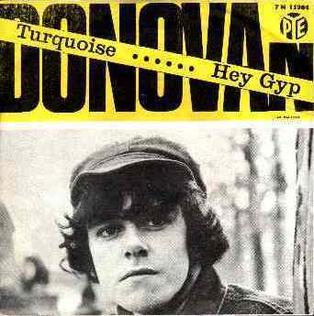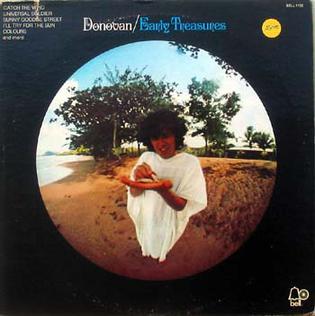
Donovan is a Scottish singer, songwriter and guitarist. He developed an eclectic and distinctive style that blended folk, jazz, pop, psychedelia, and world music. He has lived in Scotland, Hertfordshire (England), London, California, and since at least 2008 in County Cork, Ireland, with his family. Emerging from the British folk scene, Donovan reached fame in the United Kingdom in early 1965 with live performances on the pop TV series Ready Steady Go!.

What's Bin Did and What's Bin Hid is the debut album from British singer-songwriter Donovan. It was released in the UK four days after his nineteenth birthday on 14 May 1965, through Pye Records. Terry Kennedy, Peter Eden, and Geoff Stephens produced the album. The album was released in the US as Catch the Wind on Hickory Records in June 1965. Hickory Records changed the title to match that of Donovan's debut single.

Rising Again is an expanded version of the 1990 live album Rising from Scottish singer-songwriter Donovan. It was released in the UK on 22 May 2001.

The Real Donovan is the first compilation album from Scottish singer-songwriter Donovan. It was released in the U.S. in September 1966.

"Catch the Wind" is a song written and recorded by Scottish singer-songwriter Donovan. It was released as a single in the United Kingdom on 12 March 1965 through Pye Records and a few months later in the United States through Hickory Records. The single was backed with "Why Do You Treat Me Like You Do?" on both the United Kingdom and United States releases.

"Colours" is a song written and recorded by British singer-songwriter Donovan. The "Colours" single was released in the United Kingdom on 28 May 1965 through Pye Records and a few months later in the United States through Hickory Records. The "Colours" single was backed with "To Sing for You" on the United Kingdom release and "Josie" on the United States release.

"Turquoise" is a song written and recorded by British singer-songwriter Donovan. The "Turquoise" single was released in the United Kingdom on October 30, 1965 through Pye Records and charted, peaking at No.30. The "Turquoise" single was backed with "Hey Gyp " and only released in the United Kingdom. "Turquoise" was released as the b-side on "To Try for the Sun" in the United States.

Like It Is, Was, and Evermore Shall Be is a compilation album from Scottish singer-songwriter Donovan. It was released in the US in April 1968. Like It Is, Was, and Evermore Shall Be marked the second Hickory Records compilation of Donovan's 1965 Pye Records material in the United States, following the moderately successful The Real Donovan from 1966.

Early Treasures is a compilation album from Scottish singer-songwriter Donovan. It was released in the United States in 1973.

Catch the Wind is a compilation album from Scottish singer-songwriter Donovan. It was released in the United Kingdom in 1971 and did not chart. This 1971 release bears little resemblance to the 1965 version of What's Bin Did and What's Bin Hid released as Catch the Wind in the United States.

Donovan File is a compilation album from Scottish singer-songwriter Donovan. It was released in the United Kingdom in 1977.

Catch the Wind is a compilation album from Scottish singer-songwriter Donovan. It was released in the United Kingdom in April 1986 and did not chart. This 1986 release bears little resemblance to the 1965 version of Catch the Wind released in the United States or to Catch the Wind from 1971.

Colours is a compilation album from Scottish singer-songwriter Donovan. It was released in the United States in 1991.

Universal Soldier is the second compilation album from Scottish singer-songwriter Donovan. It was released in the UK in September 1967.

Summer Day Reflection Songs is a compilation album from Scottish singer-songwriter Donovan. It was released on April 25, 2000.

Catch the Wind is a compilation album from Scottish singer-songwriter Donovan. It was released in Australia on 28 November 2000.

Catch the Wind is a compilation album from Scottish singer-songwriter Donovan. It was released in the United Kingdom on September 30, 2003.

Hickory Records is an American record label founded in 1954 by Acuff-Rose Music, which operated the label up to 1979. Sony/ATV Music Publishing revived the label in 2007. Originally based in Nashville, and functioning as an independent label throughout its history, it has had several distributors.

Sammy Hagar is the self-titled second studio album by American rock vocalist Sammy Hagar, released in January 1977 by Capitol Records. It is also often referred to as The Red Album, as it includes Hagar's first anthem, "Red", which is also the basis for his nickname "The Red Rocker". Future multi-platinum selling producer Scott Mathews was talked into playing a drum solo on "Red" after being told Ringo Starr had played his only drum solo in the very same room on The Beatles' last album, named after the EMI Studios this album was recorded in, Abbey Road.
Peter Eden is a British former record producer and record label executive, best known for his work in the mid-1960s with Donovan, and later with jazz musicians such as John Surman.
This page is based on this
Wikipedia article Text is available under the
CC BY-SA 4.0 license; additional terms may apply.
Images, videos and audio are available under their respective licenses.

















